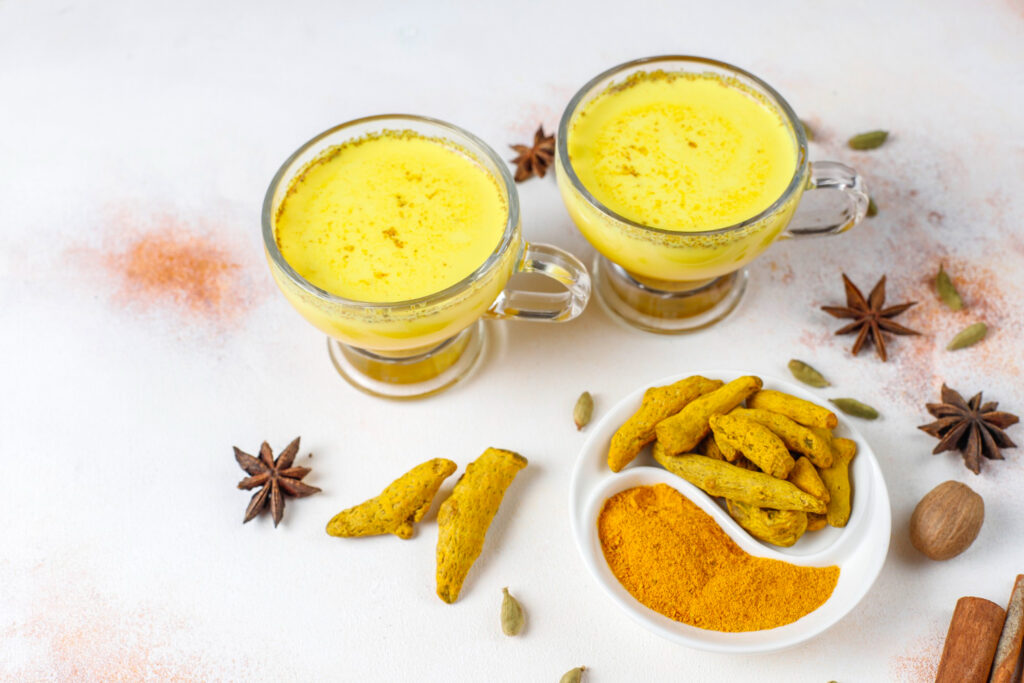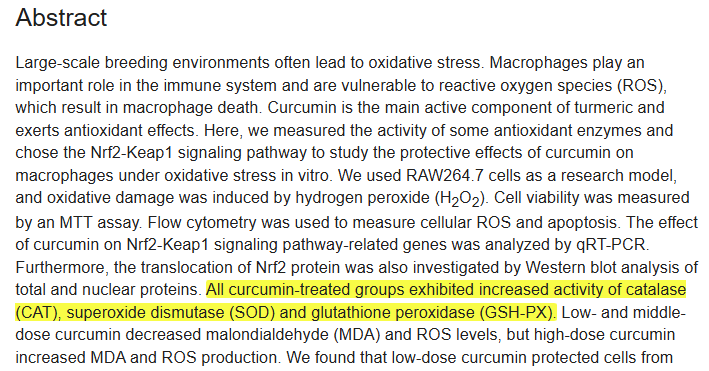I’ve spoken about so many potent plant extracts, but this one? It’s truly incredible.
Curcumin benefits, the powerful compound found in turmeric, are absolutely remarkable.
India has been growing and using turmeric for over 5,000 years, and it’s not just for cooking—it’s been a key part of Ayurveda, traditional medicine, and healing rituals for centuries.
And now, the world is finally catching on. Suddenly, turmeric is everywhere—golden lattes, supplements, skincare, you name it. The West is calling it ‘yellow gold’, but let’s be clear—the real magic isn’t in turmeric alone.

It’s in curcumin, the powerful compound inside turmeric that gives it all those amazing health benefits.
From fighting inflammation to boosting immunity, curcumin does it all. But here’s the catch—most people aren’t getting its full benefits because it’s not easily absorbed by the body. That’s exactly why we need to understand how to make the most of it.
Here, I’ll break it all down for you—why this compound is the real hero, top curcumin benefits, how to get the best out of it, and why this ancient spice belongs in your daily routine.
First, let’s clear up a common confusion!
Curcumin vs. Turmeric Powder Benefits: What’s the Difference?
Turmeric and curcumin are not the same thing. Turmeric is the bright yellow spice we use in cooking and traditional medicine. Turmeric isn’t just another Indian spice sitting on your shelf—it’s a natural healer that’s been around for thousands of years. Turmeric powder benefits go deep, especially when it comes to pain relief and inflammation.
It contains over 300 active compounds, but the most powerful one?
Curcumin.
It is the bioactive component of turmeric responsible for its anti-inflammatory, antioxidant, and healing properties. But here’s the catch—turmeric itself contains only 2-5% of this compound. That means if you’re only adding turmeric to your food, you’re getting a very small dose of curcumin’s benefits.
How does curcumin work at a molecular level?
Curcumin isn’t just another health trend—it’s backed by serious science. It works by interacting with multiple biological pathways in the body:
- It blocks inflammatory molecules (like NF-κB) that are linked to chronic diseases, from arthritis to heart disease.
- It activates antioxidant pathways in the body, neutralizing free radicals that cause aging and cell damage.
- It enhances brain function by boosting BDNF (Brain-Derived Neurotrophic Factor), which supports memory and learning. It may help in Alzheimer’s prevention.
It influences gene expression, meaning it doesn’t just reduce inflammation—it switches on the body’s healing mechanisms. This is why it’s being explored in research for cancer, metabolic diseases, and even mental health.
Curcumin is a powerful polyphenol and antioxidant
Curcumin belongs to a group of compounds called polyphenols, which are natural plant chemicals known for their health benefits. But it isn’t just any polyphenol—the antioxidant properties of curcumin are well-known. It works in two ways:
- Neutralizing free radicals: These unstable molecules damage our cells and speed up aging. Curcumin directly scavenges them, reducing oxidative stress.
- Boosting the body’s natural antioxidant enzymes: Instead of just fighting free radicals itself, this compound triggers the body’s defense system, making it a double threat against disease and aging.
Curcumin enhances the activity of glutathione peroxidase, superoxide dismutase, and catalase—three of the body’s most important antioxidant enzymes. This means it doesn’t just protect your cells—it helps your body protect itself.

Now, why does this information matter to you?
Chronic inflammation and oxidative stress are at the root of almost every major disease—heart disease, diabetes, cancer, Alzheimer’s, arthritis—you name it.
Let’s discuss curcumin’s health benefits (backed by science).
Curcumin benefits span across multiple systems in the body, from reducing chronic inflammation to boosting brain function and even fighting cancer. Let’s break down the science-backed benefits of this golden compound.
Anti-inflammatory property:
Inflammation isn’t always bad—it’s your body’s natural defense. But chronic inflammation? That’s where the trouble starts. It’s linked to almost every major disease—arthritis, heart disease, diabetes, even cancer.
Curcumin blocks NF-κB, a molecule that acts like a ‘master switch’ for inflammation. A study found that this powerful compound inhibits NF-κB activation, stopping inflammation at its root.

- Arthritis & joint health: Curcumin is as effective as ibuprofen in reducing arthritis pain—without the side effects.
- IBS & gut inflammation: It reduces gut inflammation, making it helpful for conditions like IBS, Crohn’s disease, and ulcerative colitis.
- Metabolic health: It helps reduce insulin resistance and improve fat metabolism, making it a powerful tool for managing metabolic diseases like diabetes.
Brain booster & mood enhancer:
Your brain thrives on growth and repair, and curcumin helps make that happen. It boosts BDNF (Brain-Derived Neurotrophic Factor), a key protein for memory and learning.

- Depression & Anxiety: This compound has been found to work as effectively as Prozac in reducing depression symptoms. It helps regulate serotonin and dopamine, making it a natural mood booster.
Heart health & longevity:
Heart disease is the number one killer worldwide, and curcumin helps protect your heart in multiple ways. Here are two curcumin benefits:
- Endothelial function: It improves blood vessel function, reducing the risk of heart disease. Curcumin works as well as exercise for improving vascular health.
- Cholesterol & blood pressure: Research shows it lowers LDL cholesterol and reduces high blood pressure naturally.

Cancer-prevention potential:
Curcumin’s benefits are being studied for its role in cancer prevention and treatment. It helps:
- Trigger apoptosis (cancer cell death): It selectively kills cancer cells without harming healthy ones.
- Reduce tumor growth: It slows tumor progression by blocking key cancer-promoting pathways.

Gut health & immunity:
Your gut microbiome controls everything from digestion to immunity. Curcumin helps by:
- Balancing gut bacteria: It promotes the growth of beneficial bacteria while fighting harmful pathogens.
- Boosting immunity: It modulates immune responses, making it beneficial for autoimmune diseases like rheumatoid arthritis and lupus.
This golden compound is a true superfood, but getting the most out of it requires smart absorption techniques. That’s what we’ll explore next!
Why curcumin doesn’t work for everyone?
A lot of people take turmeric and wonder why they don’t see results.
The problem? Poor bioavailability. Curcumin is rapidly metabolized and excreted, meaning most of it never makes it into your bloodstream where it can do its magic.
So, if you’re consuming turmeric without the right enhancers, you’re missing out on its true potential.
How to maximize curcumin absorption (so you actually get the benefits)?
1) Use turmeric with black pepper: One of the simplest and most effective ways to boost curcumin absorption is by adding black pepper. It is one of the many turmeric powder benefits, as it significantly increases the bioavailability of curcumin, enhancing its health benefits. How? Black pepper contains a compound called piperine, which has been shown to enhance curcumin absorption by up to 2000%!
This is why traditional Indian recipes always combine turmeric with black pepper—it’s not just for taste, it’s science-backed.

2) Healthy fats for better absorption: Curcumin is fat-soluble, which means it needs fat to be properly absorbed. That’s why having turmeric with healthy fats like ghee can help it travel through your digestive system and into your bloodstream.
Watch this video to learn more:
3) Heat activation & golden milk: Did you know that heating turmeric makes curcumin more bioavailable? One of the key turmeric powder benefits is its enhanced absorption when combined with heat, making it even more effective for overall health. Cooking turmeric in warm water, soups, or traditional golden milk can help unlock its full potential. Ayurvedic medicine has been using this trick for centuries, and modern research confirms that a little heat can go a long way in enhancing curcumin’s effectiveness.
4) Try simple recipes: For an immune-enhancing mix, combine a teaspoon of ghee with turmeric and black pepper. This blend is excellent for digestion, inflammation, and even skin health. From soothing tonic shots to powerful anti-inflammatory blends, you can enjoy turmeric powder benefits in countless ways.
Moreover, in my podcast with Dr. Akil Palanisamy—a Harvard and Stanford-trained physician, we discussed how curcumin has been both overused and underutilized due to a lack of proper understanding.
While supplement companies push high-dose of this golden compound, the real magic lies in using it naturally—fresh raw turmeric, applied topically or combined with other natural compounds for better absorption.
Just like with other antioxidants—vitamins A, C, E, or even green tea—nature’s form works best. Instead of chasing synthetic supplements, we need to focus on real, whole foods that provide these curcumin benefits in their most effective form.
The last word…
I’ve always believed that no single food, herb, or supplement is a magic bullet. Curcumin is powerful, but how it works for you depends on your bio-individuality—your gut health, lifestyle, and unique body chemistry. Some people feel its benefits almost instantly, while others may need to tweak their intake, pair it with the right enhancers, or even switch up the form (like fresh turmeric vs. a well-absorbed supplement).
The key is to listen to your body. If curcumin makes a difference in your inflammation, digestion, or mood—great! Keep it in your lifestyle. If not, maybe your body needs a different approach. That’s the beauty of holistic health: it’s never one-size-fits-all.
Try it, experiment, and use what works best for YOU.
Disclaimer: The information provided in this blog is for educational purposes only and is not intended as medical advice. Always consult with a healthcare professional before making any changes to your nutrition, supplements, or lifestyle, particularly if you have a medical condition or are taking medication.
Want personalized advice on how to incorporate curcumin into your routine?
Set up a one-on-one consultation with our integrative team to optimize your nutrition goals.
Reach out to us at 1800 102 0253 or write to us at [email protected].
- 1
- 2
- 1
- 2










